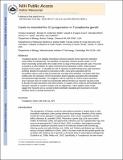| dc.contributor.author | Szatanek, Tomasz | |
| dc.contributor.author | Anderson-White, Brooke R. | |
| dc.contributor.author | Faugno-Fusci, David M. | |
| dc.contributor.author | White, Michael | |
| dc.contributor.author | Gubbels, Marc-Jan | |
| dc.contributor.author | Saeij, Jeroen | |
| dc.date.accessioned | 2014-03-14T16:14:51Z | |
| dc.date.available | 2014-03-14T16:14:51Z | |
| dc.date.issued | 2012-04 | |
| dc.date.submitted | 2012-03 | |
| dc.identifier.issn | 0950382X | |
| dc.identifier.issn | 1365-2958 | |
| dc.identifier.uri | http://hdl.handle.net/1721.1/85629 | |
| dc.description.abstract | Toxoplasma gondii is an obligate intracellular protozoan parasite whose rapid lytic replication cycles define its pathogenicity. We identified a temperature-sensitive growth mutant, FV-P6, which irreversibly arrests before the middle of the G1 stage of the tachyzoite cell cycle. This arrest is caused by a point mutation in a gene conserved across eukaryotes, Cactin, whose product localizes to the nucleus. To elucidate the role of TgCactin we performed genome-wide expression profiling. Besides the expected G1 expression profile, many genes associated with the extracellular state as well as with the bradyzoite cyst stage were identified. Consistent with these profiles were the expression of AP2 transcription factors typically associated with extracellular and bradyzoite stage parasites. This suggests a role for TgCactin in control of gene expression. As TgCactin does not contain any functionally defined domains we reasoned TgCactin exerts its function through interactions with other proteins. In support of this model we demonstrated that TgCactin is present in a protein complex and can oligomerize. Taken together, these results suggest that TgCactin acts as a pivotal protein potentially regulating gene expression at several transition points in parasite development. | en_US |
| dc.description.sponsorship | National Institutes of Health (U.S.) (Grant R01-AI080621) | en_US |
| dc.language.iso | en_US | |
| dc.publisher | Wiley Blackwell | en_US |
| dc.relation.isversionof | http://dx.doi.org/10.1111/j.1365-2958.2012.08044.x | en_US |
| dc.rights | Creative Commons Attribution-Noncommercial-Share Alike | en_US |
| dc.rights.uri | http://creativecommons.org/licenses/by-nc-sa/4.0/ | en_US |
| dc.source | PMC | en_US |
| dc.title | Cactin is essential for G1 progression in Toxoplasma gondii | en_US |
| dc.type | Article | en_US |
| dc.identifier.citation | Szatanek, Tomasz et al. “Cactin Is Essential for G1 Progression in Toxoplasma Gondii: Cactin Is Essential for Toxoplasma G1 Progression.” Molecular Microbiology 84.3 (2012): 566–577. | en_US |
| dc.contributor.department | Massachusetts Institute of Technology. Department of Biology | en_US |
| dc.contributor.mitauthor | Saeij, Jeroen | en_US |
| dc.relation.journal | Molecular Microbiology | en_US |
| dc.eprint.version | Author's final manuscript | en_US |
| dc.type.uri | http://purl.org/eprint/type/JournalArticle | en_US |
| eprint.status | http://purl.org/eprint/status/PeerReviewed | en_US |
| dspace.orderedauthors | Szatanek, Tomasz; Anderson-White, Brooke R.; Faugno-Fusci, David M.; White, Michael; Saeij, Jeroen P. J.; Gubbels, Marc-Jan | en_US |
| mit.license | OPEN_ACCESS_POLICY | en_US |
| mit.metadata.status | Complete | |
